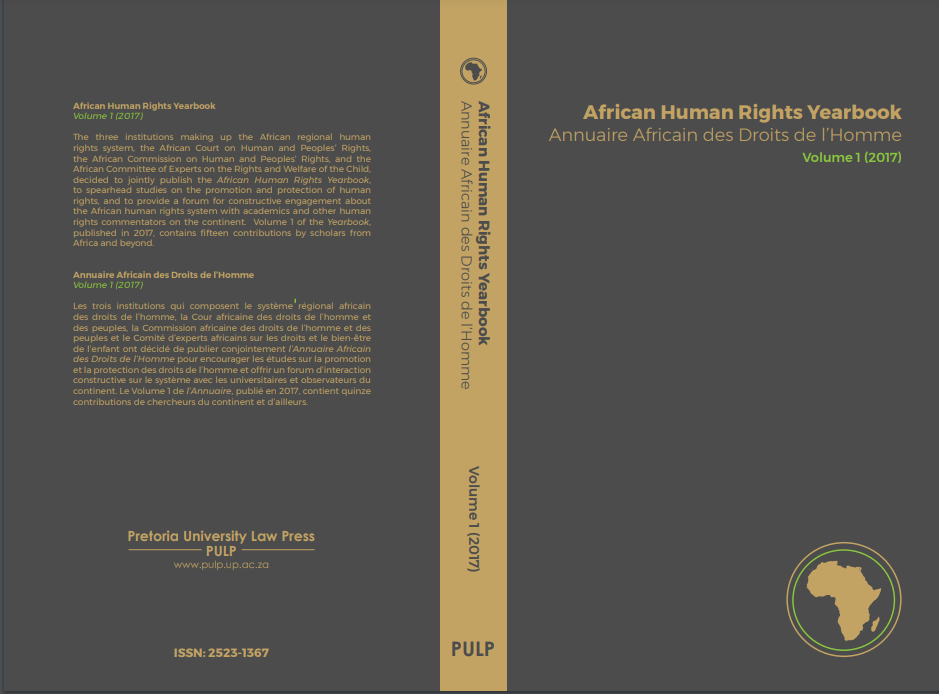The normative power of the right to selfdetermination under the African Charter and the principle of territorial integrity: competing values of human dignity and system stability
DOI :
https://doi.org/10.29053/2523-1367/2018/v2n1a3Mots-clés :
norm, right, self-determination, state, territorial integrityRésumé
ABSTRACT: This article considers the interaction between the right of selfdetermination and the principle of territorial integrity, two powerful norms seemingly pulling in opposite directions, with reference to relevant texts and decisions of the African Commission on Human and Peoples’ Rights. It posits that the enjoyment of complete self-determination is constrained by the somewhat skewed interpretation given to the norm by the Commission. The basic argument canvassed is that the right of self-determination is an enabling, ongoing collective human right applicable in colonial and certain post-colonial contexts. The case-law on self-determination shows that while the Commission readily upholds the right of internal self-determination it always declines claims to external self-determination. The dubious reasoning of the Commission is that this variant of self-determination is unavailable in post-colonial Africa because of its incompatibility with the principle of territorial integrity. And yet the right of self-determination is available to other oppressed peoples even in a non-colonial context to assert their humanity, dignity and freedom. The author concludes that while selfdetermination and territorial integrity appear to be pulling in opposite directions, in fact the two norms are not always in conflict. Sometimes they complement each other and are mutually reinforcing. Sometimes also, one norm yields to the other as a matter of law. In circumstances where the law is silent on the question of which norm prevails over the other, it seems meaningful that self-determination should prevail over territorial integrity on account of the fact that it is people who determine the destiny of territory and not the other way round.
TITRE ET RÉSUMÉ EN FRANCAIS: Le pouvoir normatif du droit à l’autodétermination dans la Charte africaine et le principe d’intégrité territoriale: l’opposition entre les valeurs de dignité humaine et de la stabilité du système
RÉSUMÉ: Cet article examine l’interaction entre le droit à l’autodétermination et le principe d’intégrité territoriale, deux normes fondamentales qui, en référence aux textes et décisions pertinents de la Commission africaine des droits de l’homme et des peuples, semblent chacune tirer dans sa direction. Cet article suggère que la jouissance d’une autodétermination complète est limitée par l’interprétation quelque peu biaisée donnée à la norme par la Commission. L’argument principal est que le droit à l’autodétermination est un droit de l’homme collectif applicable dans les contextes coloniaux et dans certains contextes postcoloniaux. La jurisprudence en matière d’autodétermination montre que, si la Commission soutient facilement le droit à l’autodétermination interne, elle refuse toujours les demandes d’autodétermination externe. Le raisonnement douteux de la Commission est que cette variante de l’autodétermination n’est pas disponible dans l’Afrique postcoloniale en raison de son incompatibilité avec le principe de l’intégrité territoriale. Et pourtant, le droit à l’autodétermination est ouvert à d’autres peuples opprimés, même dans un contexte non colonial, pour affirmer leur humanité, leur dignité et leur liberté. L’auteur conclut que, alors que l’autodétermination et l’intégrité territoriale semblent aller dans des directions opposées, en réalité, les deux normes ne sont pas toujours en conflit. Parfois, ils se complètent et se renforcent mutuellement. Parfois aussi, l’une des normes cède la place à l’autre en droit. Dans les cas où la loi reste muette sur la question de savoir quelle norme prévaut sur l’autre, il semble logique que l’autodétermination l’emporte sur l’intégrité territoriale, du fait que ce sont les personnes qui déterminent le destin du territoire et non l’inverse.


